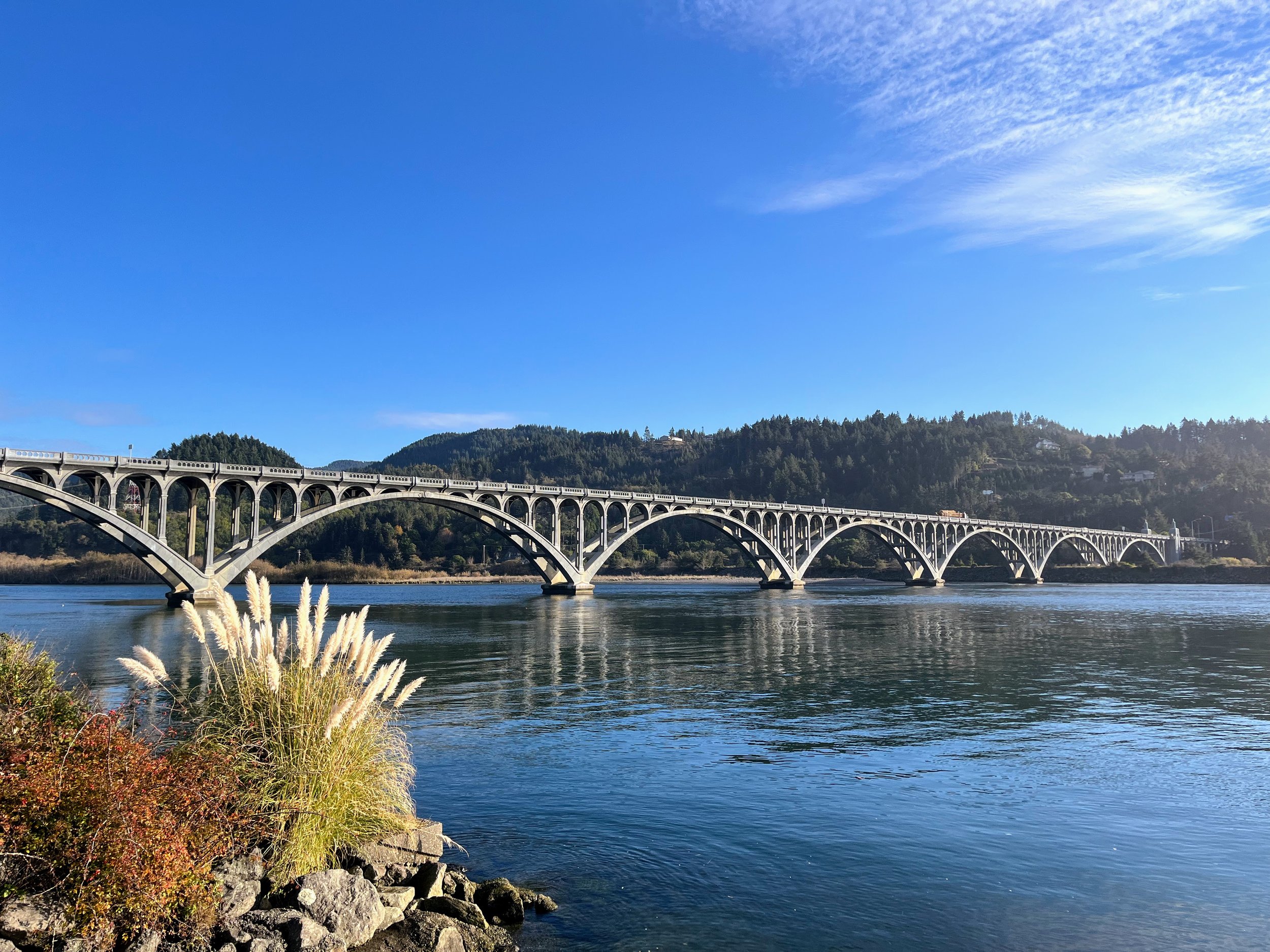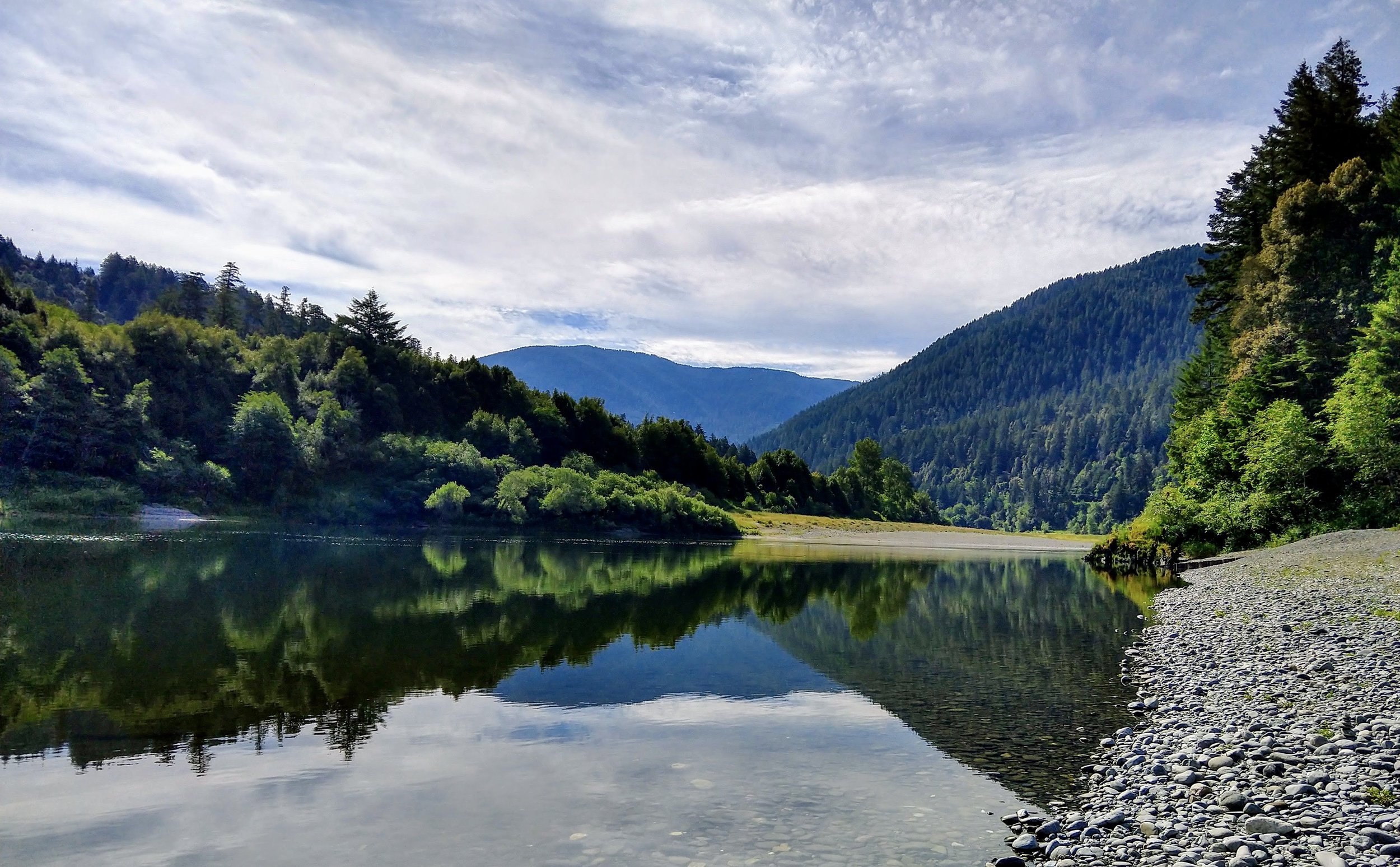What does Gold Beach, Oregon have to offer?
Located on scenic Highway 101, Gold Beach is tucked in between the Pacific Ocean, the Rogue River, and the Siskiyou Mountains. It’s the ideal blend of rejuvenating solitude and true adventure.
Walk for miles on the uncrowded beautiful beaches in Gold Beach. Hike along, paddle, or raft the Wild and Scenic Rogue River. Take in the expansive protected forest lands surrounding town. This is a tranquil, unspoiled coastal haven.
Those seeking a retreat from the fast-paced modern world will find comfort in Gold Beach. Places like Gold Beach are becoming more and more rare as cities expand.
Unlike many tourist destinations, Gold Beach remains untouched by commercialization. The absence of big box stores and fast food contributes to its authentic charm, yet there still is healthy growth and development in town.
The local communities take pride in and use the resources of the diverse environment: hiking amongst the old-growth Myrtle Wood and Douglas Fir stands, hunting in the Rogue River-Siskiyou National Forest, salmon fishing on the Rogue River, beachcombing, windsurfing, and more. Countless outdoor activities encourage the locals and invite visitors to connect more deeply with the natural surroundings.
Gold Beach is located on the coast just 40 miles north of the California border.
The population is around 2,255 within the city limits. Gold Beach is the county seat and has Curry General Hospital.
Familiar conveniences are not too far away.
Brookings, OR is just 30 miles south on Hwy 101 and has a bigger town center. Medford, OR is about a 3-hour drive as is Eugene, OR. Both of these cities have airports that service many airlines.
-
Gold Beach has cool, very wet winters and mild, relatively dry summers. Gold Beach has a warm summer with a “Mediterranean-like” climate.
Over the course of the year, the temperature typically varies from 44°F to 67°F and is rarely below 37°F or above 74°F.
There is a typical summer north wind and storms in the winter almost always come out of the south.
Gold Beach is the perfect place to watch winter storms.
-
Although Gold Beach had been a community since the middle of the 19th century, and the county seat since 1859, its incorporation charter is dated 1945.
Prior to 1850, there are very few accounts of anyone other than the Native Americans being here. One account was of Jedediah Smith who came up our coast in 1828. The Smith account is quite amazing and can be looked up online if you are interested.
The coastal Natives of this immediate area spoke the Athabaskan language which is similar to the Apache, Navajo and other native tribes from Alaska. Only a few tribes in this small area were Athabaskan speaking.
Gold Beach was originally named Ellensburg in the 1850s, but later became known as Gold Beach due to the beaches near the mouth of the Rogue River hosting hundreds of gold mines. The town’s name was changed to Gold Beach in 1890.
During the mid to late 1800’s R.D. Hume, an early settler, built several steamboats for delivering goods along our coast. He also established a cannery and a hatchery during that time.
The late 1800’s mining became more and more a local industry along with commercial fishing in the Rogue River. In the 1930’s, logging started to become a viable profession. Into the 1970’s, there were many small sawmills scattered through the mountains east of Gold Beach and up the Rogue River. As a result of this, there were many logging camps scattered out in the mountains.
In the 1950’s, logs were sometimes rafted down the Rogue for transport to various mills in the area. During the ’60’s, there were at least 20 large sawmills within a 10-mile radius of Gold Beach. These mills rapidly disappeared, and the whole area in the 1980’s saw the last of them disappear, with the exception of two in Brookings.
R.D. Hume built an empire with the raising of salmon in his hatchery and the collection of tons of eggs for this purpose. His commercial fishing in the Rogue was accomplished by using his fleet of gill netting boats. He was known as the “Salmon King of Oregon”. He and his fleet of gill-netting boats controlled most of the anadromous fish population of the river fishing its lower 12 miles. In 1935, The State of Oregon banned gill-netting.
The salmon runs in the Rogue were so profuse that famous politicians, movie stars and high ranking military personal made the rigorous trek to Gold Beach to hire guides for the pleasure of catching a big fish.
-
The most common way to get to Gold Beach is by car.
From the north (Eugene, Salem, Portland and north), you may choose to go south on Interstate 5 past Eugene, then go west on Hwy 38 to the coast, then south on US 101 to Gold Beach.
From the east (Grants Pass, Medford or Ashland), Hwy 199 is your best bet, then go north on US 101.
From the south (California travelers located in Sacramento and south) you may take Interstate 5 north to Hwy 20 west toward Ukiah, then US 101 north to Gold Beach. Or simply take Hwy 1 / 101 North to Gold Beach.
Flying yourself into the Gold Beach Airport? Gold Beach has a municipal airport and some of the best views and conditions along the coast. Check out the Port of Gold Beach for more airport information.
-
People come from all over to experience world-class river fishing year-round for salmon, steelhead, and trout. There are more than 20 guides who help their clients catch salmon, steel head. There are ocean charters for lingcod and rockfish. You can also dig for clams and drop your own traps for Dungeness crab.
Elk, deer, turkey, and bear are hunted in the forests and wilderness areas near Gold Beach.
-
Cedar Bend Golf Course, our local 9 hole course, is located 10 miles north of Gold Beach.
Salmon Run Golf & Wilderness Preserve is 30 miles south of Gold Beach. A championship 18-hole course with outstanding views and peace and quiet.
The world renowned Bandon Dunes gold resort, with 6 distinct courses, is just a little over an hour north of Gold Beach.
-
This name was chosen by representatives from the various communities to help uniquely identify this 70 mile stretch of coast and inland adventure areas. We are not only graced with miles of beautiful coastline and unique communities throughout Curry County, but there are four nationally designated “Wild Rivers”.
The rivers starting just north of Port Orford and coming south are Elk, Rogue, Illinois, and the Chetco. Not only are the wild rivers in our back yard but there are two wilderness areas nearby. The Grassy Knob Wilderness is inland of Port Orford at the headwaters of the Elk River. The Kalmiopsis Wilderness is 500,000 acres and stretches from the Illinois River south to nearly the California Border.
From Gold Beach you can drive 20 miles out into the mountains and be on the edge of the wilderness.




